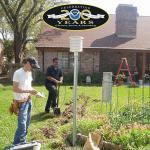The Citizen Science of Climate Change: We Are Not Bystanders

My post below originally appeared at Scientific American Blogs
Superstorm Sandy prior to the 2012 Presidential election put climate change on the mind of many voters. Earlier this month, a Federal Advisory Committee of 13 collaborating agencies released a Draft Climate Assessment Report for public review. The data show the climate is already changing: rising sea-level, ocean acidification, damage to infrastructure, and impacts on human health, water resources, and agriculture. Because the data make it hard to remain optimistic, many were thankful to hear Obama say at his inauguration, “We’ll respond to the threat of climate change, knowing that the failure to do so would betray our children and future generations.”
One overlooked aspect of the data, however, can also give us reason for optimism. Although credit for the report is given to 240+ scientists and engineers who compiled the evidence about global climate change, the backbone of the knowledge presented arises from efforts of unsung (and unwitting) heroes: people who collect weather data. The coordinated, cross-generational, collective nature of the public data-collection efforts reveals an unexploited strength in our society that should give us hope.
It’s often unclear where climate change data come from; like many others, I had assumed it’s all generated by satellites circling the earth and buoys floating in the ocean. While those technologies play a role, data on the key variables of temperature and precipitation have been, and still are, collected by otherwise ordinary people. Thus, evidence for climate change is not because “scientists say so”, but rather because the collective observations of people show we have shorter, warmer winters, and longer, hotter summers, periods of extreme heat lasting longer than any living American can recall, and rain in extremes: either heavier downpours or droughts. Separately, people across the country have noted these observations in their backyards. Scientists have pooled the observations to reveal widespread patterns.
The new assessment is an impressive synthesis of the most up-to-date studies in the peer-reviewed literature about climate change. It details negative impacts in a wide array of economic sectors, from maple syrup in Vermont to oysters in Washington. Each study that involved rain, snow, and temperature measurements drew those data from the U.S. Cooperative Weather Observer Program: a citizen science network.
The Program is not often referred to as citizen science, probably in part because it started generations before the term was coined, but that’s what it is.
Public contributions of weather measurements date as far back as the availability of instruments to measure weather. When founding our nation, Thomas Jefferson wanted to deputize one person in every county in Virginia to collect temperature and wind data twice a day. The Revolutionary War pre-empted these plans.
The concept kept recurring. In the late 1840s, Matthew Maury wanted farmers to collect weather data and share them via the telegraph so that his naval office could aggregate reports and make forecasts. He adapted the idea from a maritime system he coordinated, whereby weather information crowdsourced from merchant ships was turned into wind and current maps that quickened ocean travel. The Civil War pre-empted his land-based weather plans.
In 1870, President Grant formed an agency to coordinate a volunteer weather observer program. The program eventually became the U.S. Cooperative Weather Observer Program of the National Weather Service. Since then, gathering standardized weather data has been a tradition in many families at 12,000 sites in the U.S. Take a look at the National Weather Service newsletters honoring long-term service and you’ll see Terrell Phillips of Douglas, Georgia, who took over observations after his father passed away so that their weather station has operated for a continuous 50 years. You’ll see Sara Waddell of Woodruff, South Carolina, who received a 25-year length of service award, following in her parents’ footsteps. Her mother had observed since 1956 and her father since 1987. And we can thank Robert Hoppe of Broadwater County, Montana, for 40 years of service; he comes from a farming family that has recorded since 1939. Together, people contribute about one million volunteer hours annually. A core of about 1,200 of these sites has continuous history ideal for climate change research.
It would be nearly impossible for me to accept the burden of the report’s conclusions – climate change is not only real, but accelerating – if it weren’t for the one glimmer of hope that I see in all knowledge coproduced via citizen science: the power of the coordinated, collective efforts of curious, dedicated people. The discovery and understanding of global climate change, which has been so hotly debated, was possible because we are not a country of bystanders. We are participators. When the weather service asked for help, people helped. Because of participation, we have an inkling of the threats that we face.
I don’t know the solutions to global climate change. You probably don’t either. But any solutions will certainly involve collective action. It was our uncoordinated collective action, in the form of burning fossil fuels, that has made the climate change problem. And it was our coordinated collected action that informed us of the problem. We all will be forced to deal with climate change, so the question is: which type of collective action do we prefer? The coordinated, dedicated, collective efforts embedded in family traditions and daily practices as seen in citizen science illustrate the attributes and possibilities we need to find the best path forward. As President Obama said, we won’t let down our children or future generations—indeed, we’ll teach them to participate.
Caren is a scientist at the Cornell Lab of Ornithology where she carries out research on birds almost exclusively with data collected by willing and able hobbyists. Caren has contributed guest blog posts about the history of citizen science for Scientific American. Twitter: @CoopSciScoop
